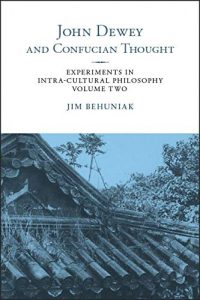SUNY has brought out a major work by Jim Behuniak: John Dewey and Daoist Thought: Experiments in Intra-cultural Philosophy, Volume One and John Dewey and Confucian Thought Experiments in Intra-cultural Philosophy, Volume Two.
There is also a significant savings in buying the two volume set; see here. Congratulations, Jim! Summaries follow.
Volume One:
In this timely and original work, Dewey’s late-period “cultural turn” is recovered and “intra-cultural philosophy” proposed as its next logical step—a step beyond what is commonly known as comparative philosophy. The first of two volumes, John Dewey and Daoist Thought argues that early Chinese thought is poised to join forces with Dewey in meeting our most urgent cultural needs: namely, helping us to correct our outdated Greek-medieval assumptions, especially where these result in pre-Darwinian inferences about the world.

